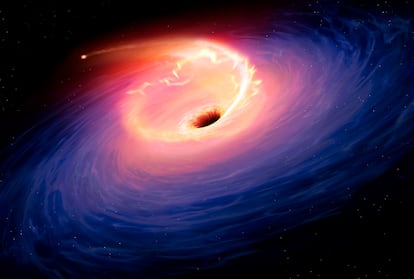How do black holes affect time?


There are two ways to think about time in relation to black holes . One has to do with how long these objects live, and the other has to do with how time is perceived inside them.
Let's go to the first one. When we think of black holes, we imagine them to be eternal. But surprisingly, they are not. According to Einstein's theory of relativity , a black hole is an object located at a point in space-time where gravity is so intense that nothing can escape it. Not even light. Everything that enters or that originated there before the black hole appeared stays there. These objects have a region that acts as their boundary, called the event horizon. Anything that crosses that boundary is trapped forever. This is what we understand by a black hole according to the theory of relativity.
But if we add quantum mechanics, things change. British astrophysicist Stephen Hawking proposed that black holes can emit a very faint form of radiation, known as Hawking radiation. This is because, according to quantum physics, empty space isn't really empty; pairs of particles and antiparticles are continually being created. Normally, even when they are created, they annihilate each other, and nothing happens. But if this happens near the event horizon, one particle can escape, being ejected from the black hole, and the other can fall into it. The end result is that the black hole loses a very small amount of mass.
Over time, this process causes the black hole to lose energy because, according to Einstein's equation (e = mc2), energy and mass are equivalent. The result is that they eventually lose their mass, and black holes evaporate. Although this happens extremely slowly. For example, our galaxy has a supermassive black hole at its center, about a million times the mass of the Sun. So you can imagine how long it will take for it to disappear because of those small, constant losses of radiation I was talking about. The entire age of the universe is just a fraction of the time it takes for it to evaporate.
Some theories suggest that microblack holes could form in particle accelerators. They would be incredibly small and evaporate almost immediately. As a result, they pose no danger to human life.
As for the other way time relates to a black hole, it's how proximity to one of these celestial objects affects time. As I mentioned before, the gravitational pull near a black hole is very strong, and that changes how we perceive time and space. If an observer who is very far from the black hole sees something falling toward them, approaching the event horizon, they'll see that time passes more slowly. As if time were freezing.
On the contrary, if the observer were to fall toward a black hole, they would notice nothing strange as they crossed the event horizon, the limit beyond which there is no return. Gravity is so intense that nothing, not even light, can escape. Once that threshold is crossed, fate is inevitable: according to Einstein's theory of relativity, one would end up in a singularity, a point where the known laws of physics cease to apply.
Yetli Mariana Rosas Guevara holds a PhD in astrophysics and is a researcher at the Donostia International Physics Center (DIPC) .
Coordination and writing: Victoria Toro .
Question sent via email by José Manuel Desviat Manzanares .
Nosotras Respondemos is a weekly science consultation, sponsored by the L'Oréal-Unesco ' For Women in Science ' program and Bristol Myers Squibb , which answers readers' questions about science and technology. These questions are answered by scientists and technologists, members of AMIT (Association of Women Researchers and Technologists). Send your questions to [email protected] or via X #nosotrasrespondemos.
The advice in this clinic is general in nature and does not replace medical advice. If you have questions about your specific problem, please consult your healthcare professional.
EL PAÍS




